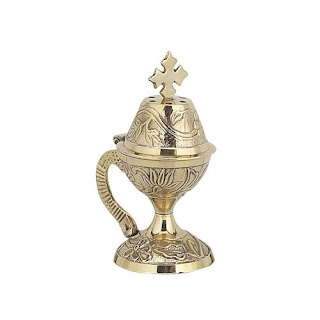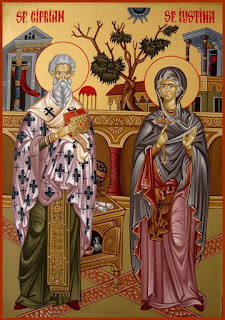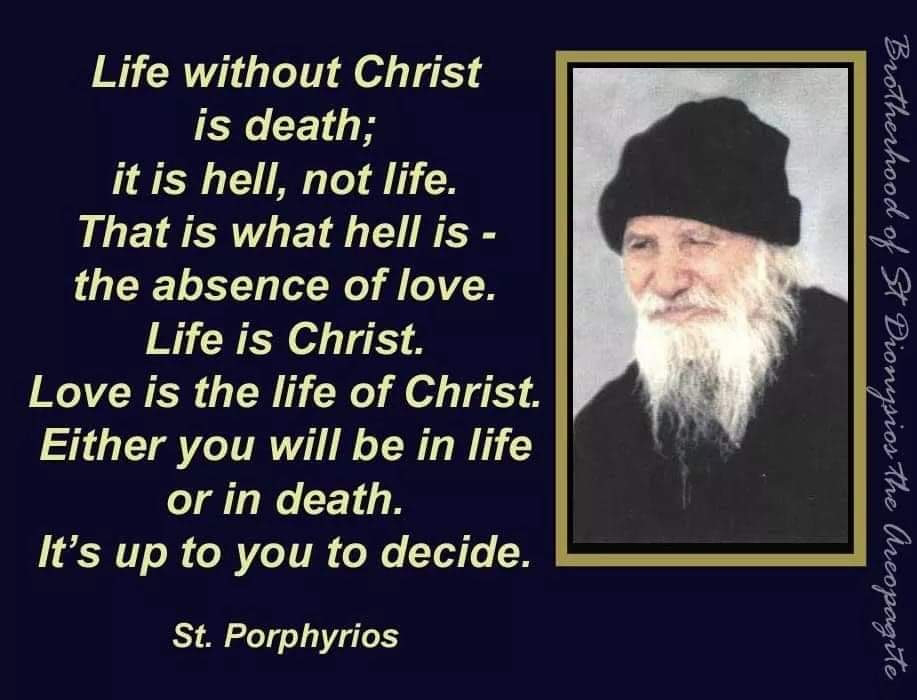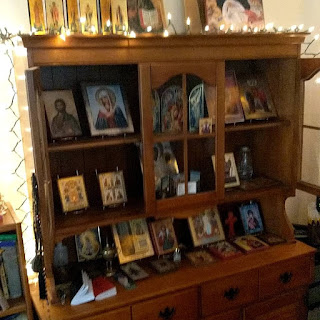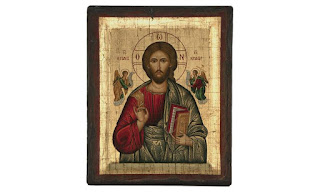Nov. 4, 2019
This weekend was a lot about prayer.
After our neighbors left for the hospital for the baby's MRI on Saturday, we came in and lit candles and incense in the censer and said prayers for the sick. Afterwards, I was trying to open the censer so I could add more incense (it comes in bags and it looks like little tiny rocks)

to the hot coal, and the censer tipped over, because it's HOT and the lid is heavy, and the coal slid behind the bookcase. (By the way, when I light the charcoal for the incense and blow on it, I have to laugh that my years smoking hookah weren't a complete waste). So, we had to move the bookcase out, put the hot coal into a cup of water with a wet paper towel, and sweep up the sand and ashes that spilled.
When we got everything put back, I lit the censer again. We have beeswax candles that burn super fast, so I need to start thinking about buying more. It's nice to be able to buy them from the church-- you can buy candles of all sizes to light for people at church-- but it's also expensive, so I'll probably re-order from Amazon.
The neighbors were at the hospital for a long time. They had to anesthetize the baby to perform the
MRI, and the MRI itself took two hours. They were somber when they returned and said they wouldn't hear anything until Monday-- if then. We got a text asking us to go to Catechumen class early to help out at the church, so we left and went and helped clean some stuff from the party Thursday night. I sanitized all of the highchairs and kids' chairs while Darren moved tables around and chairs to get them ready for the Agape meal on Sunday, and also, for Catechumen class of course.
Catechumen class was very good, but Vespers was even better. It's so beautiful and peaceful with the lights dimmed and the lit candles. And Father Justin spoke a lot about prayer. He was talking about these Orthodox priests who were imprisoned in Romania just for being Orthodox priests, and they were tortured. I read online later about the torture and "re-education" program, but I had to stop reading, because it was even more terrible than what Father described to us. And these priests survived their experiences through deep inner prayer. And then they forgave their torturers. Father Justin was talking to one of the priests and happened to see the priest without his hat. His head was severely dented, and Father exclaimed over it, and the priest said, "From the rifle butts. But this was nothing. The spiritual and emotional scars are deeper." Basically, they tried to make the priests blaspheme, and they tried to get the priests to deny their faith. And they also tried to make the priests inflict torture on each other. Some of them tried to kill themselves so they wouldn't have to torture someone else.
So, how did prayer save these priests? There were priests who were put into chambers with hundreds of lightbulbs so closing their eyes did no good. And that can make people insane-- isn't that interesting, because we speak of God's light being either painful or cleansing? Light can literally make you insane if you get too much of it. This priest came out of the torture with his sanity in tact because he went deeply into himself in prayer. This requires a lot of discipline. Same with surviving solitary confinement for YEARS. One priest said he used to make friends with the cockroaches because they were other living creatures, and he would weep when they would leave.
We live pretty cushy lives. We don't really *need* to pray or to rely on God, because we live under the delusion that we are self-sufficient. Or, we turn to God in prayer when our little baby neighbor gets cancer in her eye, and we think, "Oh, whoops, I need a little more help than I thought!"
But that's the lie: That we don't need prayer or to rely on God daily. We do. How many of us can say that our lives are aligned every moment with Christ? Some of the monks say the Jesus prayer while they walk, and one monk whom Father Justin met could hear the little old man muttering to himself as he walked around. When Father Justin asked him about it, the monk said, "I'm talking to Christ. You can't sin while you are talking to Christ." And he would just sort of give Christ a running commentary of what he was doing and thinking.
Father Justin was pleading with us to take our prayer lives seriously, and to devote more time to prayer than we do to Facebook or television or other things that may not be harmful in and of themselves, but certainly don't bring us closer to Christ.
This is what Darren and I have been searching and searching for. I've never heard someone plead with me so much to pray for my own sake, because as I said in an earlier post, our prayers don't help God. I have also never had anyone provide the tools for me to put into practice to help me draw closer to God. Fasting teaches us to die to ourselves every day. Of course we would rather eat a cheeseburger than carrots and hummus again during long fasting periods. But we can deny ourselves that cheeseburger because we are humans.
We aren't animals. We don't have to give in to every whim we have. And I can stand for longer and longer periods at church without sitting, because if I sat and prayed and it was easy, what would I truly be giving to God? Father Paul said, "If your legs and back hurt while you're praying? Glory to God!" And if go and stand in front of the icons to pray when I'm very tired and just want to climb into bed, then I am dying to myself. I am dying to my own wants, and I am focusing on Christ.
So, why is it important for me to die to myself every day? Because the more I can empty myself of my own wants and needs, the more room I have for Christ to fill me. That means, in its most simple form, the more room I have for love.
I have never been to another church that asked so much of me for my own sake before. It doesn't benefit anyone else if I fast. We aren't even supposed to talk about it with others (we share recipes, but we're not supposed to boast or complain about it, or ask anyone else if they are keeping the fast).
It can benefit others if I pray, and I'll have to sort of tease this out. Mostly, it's about love. God isn't looking for reasons not to save us. God wants us to turn to him. He will not overrule our free will, but he will save us whenever possible. And so if I pray for someone, even if they are dead, I'm showing love for them. I'm helping to redeem them through love. I don't know if that makes sense-- but maybe loving people through prayer can help lift them up.

Father Justin told the story of a woman who lived in the old country. She was baptized, but she was just mean and nasty her whole life. So, after she died, she went to hell. And the demons and other people there rejoiced, because she was such a terrible person. But then they got the news that no: She was, in face, going to be lifted into heaven. Because one time she had given a beggar an onion. That one instance of love was enough to save her, because God wants to save us. So, an onion (think of one of the long-stemmed onions, not a round one) was lowered to her, and she grasped it, and was lifted toward heaven. The other people started grabbing onto her, saying, "Take us with you!" She kicked them off, saying, "No, this is mine!" And the onion disappeared and she dropped back into hell. Because she didn't have love.
Yesterday after liturgy, Father Justin said prayers for the dead for two people: One is the wife of a priest who died suddenly on Thursday evening of a heart attack. She leaves four small children. She was 35.
The other person was a friend of one of our parish families. She was a ten-year-old little girl named Destiny who committed suicide.
When we say prayers for the dead, altar boys bring out a small table with a dish of
Koliva. It's a wheat dish that takes a very long time to prepare, and people often prepare it for Soul Saturdays in which general commemorations are made for the dead.
"In the 5th century CE koliva in the sense of boiled wheat, constituted along with raw vegetables the diet of monks who refused to eat bread.[5] The 12th century canonist Theodore Balsamon maintained that koliva as a ritual food practice was originated by Athanasius of Alexandria during the reign of the Emperor Julian the Apostate.[6]
The association between death and life, between that which is planted in the ground and that which emerges, is deeply embedded in the making and eating of koliva. The ritual food passed from paganism to early Christianity in Byzantium and later spread to the entire Orthodox world.
Christian interpretation
Romanian colivă used in a religious ceremony in a Christian Orthodox church
Orthodox Christians consider koliva to be the symbolic of death and resurrection, according to the words of the Gospel:
Verily, verily, I say unto you, Except a grain of wheat fall into the ground and die, it abideth alone: but if it die, it bringeth forth much fruit. (John 12:24)
Wheat which is planted in the earth and rises in new life is symbolic of those beloved departed who have died in the hope of resurrection, in accordance with the words of Saint Paul:
So also is the resurrection of the dead. It is sown in corruption, it is raised in incorruption. It is sown in dishonour, it is raised in glory. It is sown in weakness, it is raised in power. It is sown a natural body, it is raised a spiritual body....(1 Corinthians 15:42-44)
This symbolism has its highest expression in the Saints, whose blessed state in heaven have been manifested to the world. For this reason, koliva is blessed not only at memorials for the departed, but also in commemoration of saints."
It tastes (to me) like rice pudding. They put a beeswax candle into the dish and light it and pray around the table, which they also cense with incense.

Father Justin said, regarding Destiny, this little ten-year-old girl, who had been bullied to the point that she took her own life: "Someone said to me-- and this person was an Orthodox Christian -- 'I hope Destiny doesn't go to hell.'" And then Father Justin raised his voice. "I said, 'Are you INSANE? What kind of a God do you worship?'" He went on to say that suicide is a terrible sin-- the height of selfishness-- and the Orthodox won't bury people who have committed suicide. But there is mercy and dispensation for the insane. And a ten-year-old child committing suicide is the height of insanity. "Do you not think she is in the bosom of her Father? Who has more love and compassion than any person? If we can have love and compassion for this child, how much greater is God's? Anything about God that isn't about love is not Orthododox. You can know that. I never want to hear an Orthodox Christian say anything like that ever again."
And I was so grateful to be part of a worship service that offered love and compassion and tenderness and mercy and grace to this child. Instead of judgement and condemnation. Of course, her death if a tragedy. But we pray for her. We lift her up to God. We pray for her salvation. She is blameless before God. She was a *child.*
Lord Jesus Christ Son of God, have mercy on your servant Destiny.
I got a text from Katie when I was at Catechumen class. Their doctor went in on his day off to read the MRI results. He called to tell them that the cancer is isolated to that eyeball. It has not impacted the optic nerve. It has not spread. She is a perfect candidate for targeted chemotherapy. They are leaving for Phoenix today for the first round of treatment. Imogen will keep her eye. Imogen will live. Lord have mercy. God is love.
I told Katie when we got home that I truly believed that God was showing off, that God made it so the cancer was perfectly contained to the tumor so that Imogen will recover. She said that her husband had made a remark earlier about this being an answer to prayer: "Who gave Imogen the cancer to begin with?"
He walked in just as she was saying this, so I didn't have a chance to respond.
This website says it perfectly.
God doesn't give babies cancer. But because of the Fall, illness, corruption, and death entered our world. And just as God will not impose on our free will to save us, God will allow suffering to help lift us up. People asked Jesus what sin a man's parents (or the man himself) had committed that the man was born blind. Christ responded that nobody had sinned. Jesus answered, "
Neither this man nor his parents sinned; he was born blind so that God's works might be revealed in him."
And yes, ten-year-old little girls killing themselves is a tragedy. Thirty-five-year old women dying of heart attacks is tragic, maybe especially when they leave four grieving children and a grieving husband to raise them. A baby getting cancer in her eyeball is tragic.
But we are all going to die. Every single one of us. So, it's not death that is the tragedy, but the timing or the circumstances, or the people we leave behind. And if we view this life as all we have, then death does become more tragic. But if we believe that Christ is God and that He took on human form to conquer death so that we could once again be in communion with God, there is comfort. There is mercy. There is grace.
Am I a fool to believe this? Am I just trying to find meaning in a meaningless life and universe? Am I creating God in my own image? Just believing what I want to believe? I am sure there are people who think all of those things. But I have stepped into the stream of worship that is ongoing in Heaven. I have stepped into the life of Christ. I have had glimpses of grace. And I believe.
People might also say, "Why are you putting importance on a life AFTER this one that you have no way of confirming is real? It's THIS life that is important."
And I agree. THIS life is all we have. Christ tells us in the scriptures to be in the here and now. Right now is all we have. And the answer is: It goes back to love. I can choose a life of faith and try to fill myself with love and compassion for others and for myself. And that is the life I want. And if that means that I am foolish, then I'll be a fool for Christ. Because this is my best life. This is a life that I want to be free of bitterness and full of love. This is why I am an Orthodox Christian.


